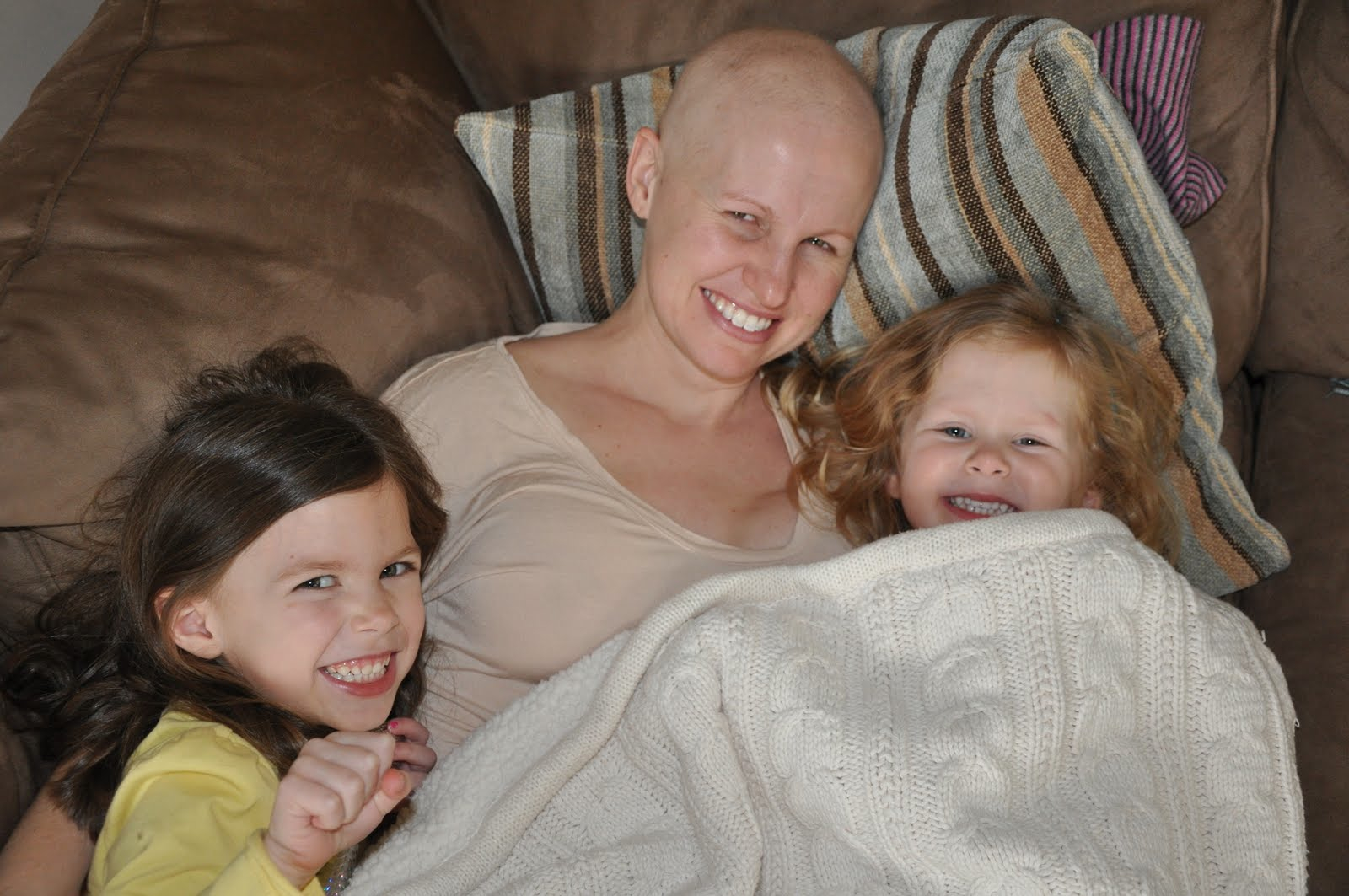
I heard my 3-year-old, Audrey, shouting before I fully realized what was going on. As I pivoted toward her tiny, elf-like voice (that seemed to be magnified by a power of ten decibels), I realized in horror that she was pointing frantically at an older, balding gentleman walking along the sidewalk in front of our house. And she was screaming, "Heyyyyy, Baldy." The man looked confused. I'm sure I looked horrified. I whipped off my cream-colored knit hat, exposing my own bald head as if this would immediately explain my daughter's inappropriate outburst. That is when I took a very serious mental note: be careful what you tell your small children about your chemotherapy-induced hair loss. Perhaps the nickname "Baldy Mommy" might seem like a very logical, light-hearted way of dealing with the idea of such a radical change in appearance, but it might also come back to haunt you ... and traumatize hair-challenged bystanders.
A cancer diagnosis is never ideal. In fact (to state the obvious), it is always very much less than ideal. Awful, scary, sad, debilitating are a few words that come to mind to describe it. For me, one of the scariest parts of my diagnosis with breast cancer was the challenge of keeping life as normal as possible for my two young daughters. How would I explain things so that they would understand the idea of cancer, but not be overly fearful? How would they react to the physical changes I would go through? How would their day-to-day lives change as I went from being completely available to them to being unable to pick them up? How would I control my own fear of this big, awful unknown so as not to project that fear onto them?
From Diagnosis Day One (i.e. the first day of my life "After Cancer"), my husband and I were very open with both of our girls, who were almost 3 and almost 5 at the time. Once we cried our own tears of fear behind closed doors, had doctor appointments scheduled and had started to come up with an action plan, we told our girls. They were playing their usual games, and we were in our usual spots on the floor playing with them when we started the conversation. We decided that the "building block" analogy was one that they might understand (as we'd spent many an afternoon building "just one more" tower/car/castle/you-name-it out of blocks).
Your body is made up of building blocks called cells, we told them. Sometimes those cells stop working like they are supposed to, and they need to be taken out of the body. Mommy has some of those bad cells in her breast, so Dr. Nathalie is going to take them out. And then Dr. Shannon is going to put little bags of gel in to give Mommy new breasts (I failed to mention that they would be significantly higher and perkier than the old pair). The girls took this information in stride and the only question we got at that time was from our 5-year-old, who was processing my all-female surgical team: "Can boys be surgeons, too?"
We were fortunate to have a very strong support network nearby during my surgeries and treatments. My mom and dad stepped in to help maintain the girls' day-to-day routine -- driving them to school, taking them to activities, cooking meals. My husband had amazing co-workers who traded shifts with him so that he could attend all of my doctor appointments as well as the girls' activities and events. My two sisters (who had both just had babies within weeks of my diagnosis) were available to help, despite their "caring for a newborn"-induced lack of sleep. Other family and friends brought meals by, volunteered to take the kids out for play-dates, and just generally tried to make our life easier during this exhausting time. Our girls literally had a village of support around them, which made the day-to-day impact much less extreme for them.
The girls were always free to ask questions or talk about cancer. We noticed that Clara (at 5) would ask questions periodically, but at 3, Audrey was more apt to talk to her dolls, saying things like, "Don't worry Baby, Mommy can pick you up because my chest doesn't hurt." While it broke my heart to hear those things, I was also so glad that she had found a way to process the new circumstances of our life.
And the honesty of children, while sometimes brutal, also provided such a refreshing outlook on things. When I would drop the girls off at preschool on the days when I wasn't too fatigued, their classmates would say things like, "Hey Clara's Mom, why did you choose a bald haircut?" One day a little boy was staring at me intently. I was sure he was confused about my bald head, so I smiled and said, "Isn't my head shiny? It gets a little cold, too." He looked at me and said, "No, what are those things on your forehead?" Oh, you mean my wrinkles. He was totally unfazed by my bald head, but mesmerized by my "laugh lines." Great, just great. But each of those interactions made me smile and appreciate a child's ability to "tell it like it is."
As I was lying next to Clara one night at bedtime, reading her a story after my active treatments were finished, she looked over at me and out of the blue said, "Mommy, the chemo is the medicine that makes it so you won't die, right?" She was unconcerned as she said this, but my eyes welled up with tears, and I tried to stop the quivering in my voice as I replied, "That's right, sweetie. That's right."
